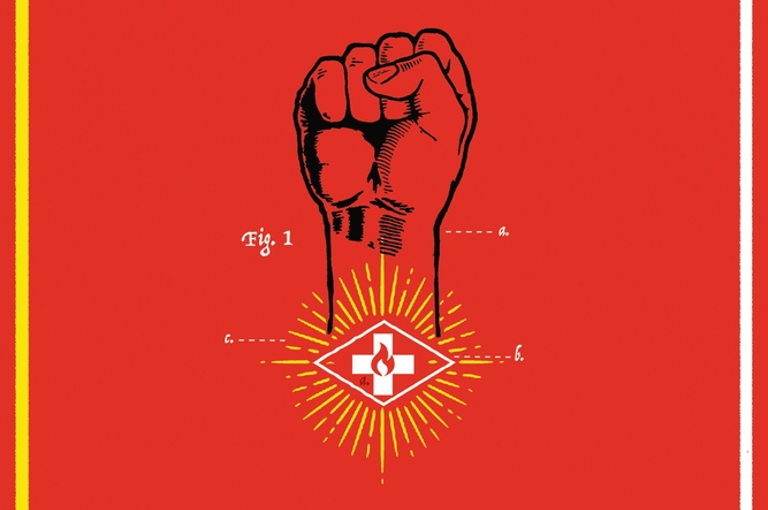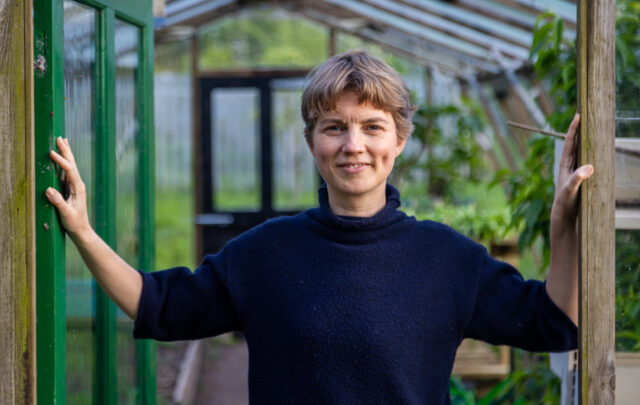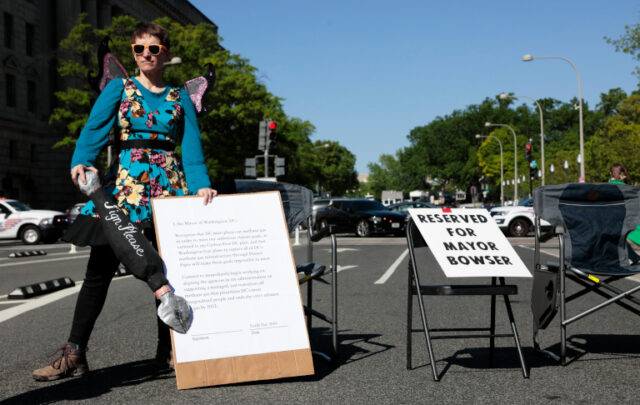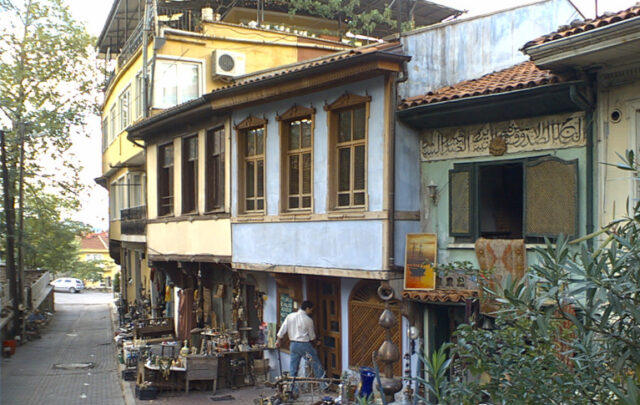As much of the world struggles to cope with the pandemic and its impacts, we speak with Dr. Rupa Marya and Raj Patel, co-authors of the new book, “Inflamed: Deep Medicine and the Anatomy of Injustice,” which examines the social and environmental roots of poor health. “Inflammation is the body’s appropriate response to damage, or the threat of damage,” says Marya, a physician and co-founder of the Do No Harm Coalition. “We’re learning that the social structures around us, the environmental, political structures around us, are tuning the immune system to sound out the full range of inflammation.” Patel adds that “capitalism primes bodies … for sickness.”
Transcript
AMY GOODMAN: The highly infectious coronavirus Delta variant is causing huge spikes in cases across the United States and around the world, with China struggling to control surging infections and the Philippines preparing for a new, stricter lockdown. The United States is now averaging some 80,000 new COVID cases a day, about six times as many daily cases than a month ago.
As much of the world struggles to cope with the pandemic and its impacts, we begin today’s show with the authors of a new book that examines the social and environmental roots of poor health. “Your body is part of a society inflamed,” write the authors. In a minute, we’ll speak with the co-authors of Inflamed: Deep Medicine and the Anatomy of Injustice, best-selling author Raj Patel and physician and activist Rupa Marya. But first, this is an animated introduction to their book by Aaron Kierbel.
DR. RUPA MARYA: You wake up one morning with a dry, hacking cough, and you’ve lost your sense of smell. You visit your doctor for a diagnosis. With an X-ray and nasal swab, she diagnosis COVID. The coronavirus infected your body, and your lungs and nerves are now inflamed.
RAJ PATEL: The inflammation sends you to hospital, and when you’re in the ICU, you look around and notice a disproportionate number of people of color. In the United States, hospitalization and death rates for people of color are far higher than for white people. You make another kind of diagnosis yourself. This, you observe, is the outcome of structural racism. But how did those structures come to be?
DR. RUPA MARYA: To understand that, we must go back 600 years to a time when a different pestilence spread across the globe, one that continues today and which still makes us sick. And it makes us sick in a patterned way, through inflammatory disease, which underlies all the leading causes of death in industrialized places.
RAJ PATEL: European colonization transformed the planet. Through slavery, genocide and disease, colonists brought with them a cosmology that changed how people relate to each other and to the living world around them. Those who resisted were set to the flame.
DR. RUPA MARYA: This history lives inside you, whether you know it or not. Since you were conceived, your body has been exposed to the consequences of a world on fire.
RAJ PATEL: The COVID hospital ward and the specific patients who are in its beds look that way because of centuries of attempts to extinguish other kinds of knowledge and civilizations.
DR. RUPA MARYA: If we understand disease with this new kind of diagnosis, the treatment options become radically different. The deep medicine we prescribe to address the inflammation of people and planet has been prescribed by others before us.
RAJ PATEL: Rudolf von Virchow and Sitting Bull and Frantz Fanon.
DR. RUPA MARYA: Huda Sha’arawi and B.R. Ambedkar and Harriet Tubman.
RAJ PATEL: They understood that our modern ills can’t simply be vaccinated away.
DR. RUPA MARYA: We need a world rebuilt with care at its heart.
RAJ PATEL: But what does that look like? Many Indigenous communities have resisted colonialism by continuing to care for the living world around them. Their care for life protects them inside and out.
DR. RUPA MARYA: Indigenous communities defend the greatest range of biodiversity on the planet and, as a result, host the most diverse microbiota inside their bodies. These microbes confer protection against inflammatory disease.
RAJ PATEL: When culture isn’t capitalist and isn’t colonized, it can soothe the inflammatory diseases that afflict us and fuel the burning of our planet.
DR. RUPA MARYA: Deep medicine offers new and old stories that connect humans to the teeming microbes in our guts and to the teeming stars in the skies. We offer a glimpse into cosmologies that bring a cooling balm.
RAJ PATEL: To a world, to societies and to bodies that are…
DR. RUPA MARYA AND RAJ PATEL: Inflamed.
AMY GOODMAN: That’s the animated introduction by Aaron Kierbel to the book Inflamed: Deep Medicine and the Anatomy of Injustice.
For more, we’re joined by the book’s authors. In Austin, Texas, Raj Patel is with us, research professor at the University of Texas’s Lyndon B. Johnson School of Public Affairs, a professor in the university’s Department of Nutritional Sciences and a research associate at Rhodes University, South Africa. He’s also the author of Stuffed and Starved: The Hidden Battle for the World’s Food System and the best-selling book The Value of Nothing: How to Reshape Market Society and Redefine Democracy.
And in Berkeley, California, we’re joined by Dr. Rupa Marya, associate professor of medicine at University of California, San Francisco, where she practices and teaches internal medicine. She’s co-founder of the Do No Harm Coalition, a collective of health workers committed to addressing disease through structural change.
Well, we welcome you both to Democracy Now! This is an epic work. Raj, let’s begin with you in Texas. If you can talk about this connection between capitalism and the COVID pandemic?
RAJ PATEL: So, thank you, Amy, for having us.
And for listeners and viewers who are unaware, one of the ways that the modern food system operates is through a sort of legacy of separating humans from the rest of the web of life. Now, what that means is that humans feel, under capitalism, and particularly under capitalist colonialism, to be able — to be free to exploit the world around us. And we feel free to be able to do that because the rest of the web of life is just worth less than our profit motive. That’s why, for example, 60% of current human infectious diseases come from pathogens that jump from one species to another, and the industrial food system incubates those kinds of diseases.
Now, while the jury is out around COVID, it’s certainly the case that we’ve seen a vast array of diseases coming from the industrial food system. And so, H1N1, for example, in 2019, was — I’m sorry, in 2009, was one example of a disease that emerged from a food system which is quite happy with treating the rest of the web of life as a disposable resource, and also quite happy in treating the working class as an expendable kind of insulation between the burn of disease and the needs of the rich and the Global North.
Now, when you have a kind of setup that’s based on this 600-year process of exploitation and colonial domination, then you’re preparing the world for pandemics not just of a virus, but also for the consequences of a virus reverberating through societies that are deeply unequal. And so, we opened today’s show talking about the climate disasters that are happening around the world. Guess who it is that’s on the frontlines of the climate crisis? It’s the same communities that are at the forefront, who have been predominantly exposed to the kinds of narratives, the kinds of exposures that render their body more ready to become susceptible to COVID.
AMY GOODMAN: Which brings us to the title. Dr. Rupa Marya, the title of your book, Inflamed: Deep Medicine and the Anatomy of Injustice. Talk about why you called it Inflamed and the kind of work you’ve been doing that shows the disparities that result from the system that we have.
DR. RUPA MARYA: Yes. Thank you for having us, Amy. And I’m happy to be speaking to you today from the occupied territory of Huichin. You can see the West Berkeley Shellmound, which our friends are trying to save, the oldest inhabited site here in the Bay Area.
So, inflammation is the body’s appropriate response to damage, or the threat of damage. And the leading cause of death and illness in industrialized places are all inflammatory disease, whether we’re talking about cardiovascular disease or cancer, Alzheimer’s disease, depression, even suicide. All of these diseases have inflammation as a part of their process.
And we’re learning now that the immune system is being primed for inflammatory disease through not just genetics, which is what we’ve been thinking about for many years. You know, why do some people get autoimmune disease? Why do some people get inflammatory bowel disease? Why do some people get cancer? But now we’re learning that the social structures around us, the environmental, political structures around us, are tuning the immune system to sound out the full range of inflammation.
And unfortunately, medical education is steeped in the same Enlightenment errors that Raj was just speaking of, separating humans from the web of life, separating civilization from nature. These kinds of dichotomies, these false dichotomies, and errors are a part of medical education today. So, while it’s helpful that we’re talking about structural determinants of health as we’re looking at the glaring disparities with the COVID crisis, we don’t learn in medicine where these structures came from or how to dismantle them. And that is really what deep medicine is. If we want to be making an impact on these structures, if we want to be making an impact on the health outcomes, we have to start working with communities who are already identifying the problems and leading the change. And so, that is, you know, a brief summary of what we’re doing in this book.
AMY GOODMAN: And if you can talk about the pandemic, Raj Patel, providing this kind of autopsy of racial disparities in the country, the profound injustices in the system? In just a few moments, we’ll be linking up with Congressmember Cori Bush, who has been sleeping on the steps of the Capitol with a number of other people protesting the fact that the eviction moratorium was allowed to expire, threatening millions of people in this country — this in the midst of a pandemic that is surging in this country.
RAJ PATEL: Well, as we approach this expiration, one of the big ideas that we have in the book is particularly the way that capitalism primes bodies, as Rupa was saying, for sickness. And this expiration is going to drive more people into despair.
But we already have the technologies of oppression that are geared towards sending the working class to despair — things like payday loans, for example. You know, if you take out a payday loan for $300, you might end up paying upwards of $800, an APR of 400%. And we know that the stress of needing to repay these loans is causing ill health, I mean, to the extent that if we were to ban things like payday loans, then in the United States the suicide rate would fall by 2.1%, and the fatal drug poisoning rate would drop by 8.9%.
Now, that kind of ongoing stress is just a normal feature of the way that capitalism operates in the United States. And this moment of triggering the lapse of the eviction moratorium is going to drive yet more people to the abyss. But Rupa has been working, for example, in San Francisco, working with physicians and protesting with them around some of the eviction-related issues and the issues around the unhoused there.
AMY GOODMAN: Dr. Rupa Marya, if you can talk about that work for just about 30 seconds? Then we’re going to go to break. We’re going to go to Congressmember Cori Bush, who’s been sleeping out on the Capitol steps for the last few days to protest this eviction moratorium expiring. And then we’re going to come back to the two of you.
DR. RUPA MARYA: Yes, we have been — the Do No Harm Coalition has been working very closely with the Coalition on Homelessness, with POOR Magazine, formerly unhoused folks, poor people who have solutions to the homeless — the manufactured crisis of homelessness here. While London Breed has been celebrated for her response to COVID, over 8,000 people were left on the streets of San Francisco in the midst of wildfire and the pandemic. And so, this is really a health crisis, and it’s an unnecessary health crisis. It’s going to jeopardize — it already is jeopardizing the health of so many people. So I applaud Cori Bush and her Bill of Rights for unhoused people. We need to look to formerly unhoused and unhoused people for these solutions and follow their lead.
AMY GOODMAN: We’re going to go to her right now, but we hope you both will stay by, Dr. Rupa Marya and Raj Patel, co-authors of Inflamed: Deep Medicine and the Anatomy of Injustice.
In an extended interview, we continue our conversation with Dr. Rupa Marya, co-author with Raj Patel of the new book, Inflamed: Deep Medicine and the Anatomy of Injustice, which examines the social and environmental roots of poor health. “We need to understand that it has to be a multimodal response to this pandemic,” says Dr. Marya. She also discusses the influence of Indigenous resistance on the creation of this book, and how this matters today in understanding the fight to stop the Dakota Access pipeline and Enbridge’s Line 3.
Transcript
AMY GOODMAN: This is Democracy Now!, democracynow.org, The War and Peace Report, The Quarantine Report. I’m Amy Goodman, as we continue with Part 2 of our look at the book Inflamed: Deep Medicine and the Anatomy of Injustice. It’s by the best-selling author Raj Patel and Dr. Rupa Marya, associate professor of medicine at the University of California, San Francisco, where she practices and teaches internal medicine. She’s co-founder of the Do No Harm Coalition, a collective of health workers committed to addressing disease through structural change.
Thanks so much for continuing this conversation with us. Dr. Marya. Why don’t you start off by talking about how you and Raj Patel came together to write Inflamed and what exactly “deep medicine” means.
DR. RUPA MARYA: Yes. Thank you for having me again, Amy.
Well, Raj and I have been friends for several years. We met at an event where I was playing with my band, Rupa & the April Fishes, and he was dressed up as a GMO tomato. We were protesting Monsanto’s environmental terror. And I had just given a talk. When we came up with the idea of the book, I had just given a talk at the University of Texas, Austin, where he was there, on my work looking at racism and state violence as health problems. This was back in 2016 or 2017.
I had been working with the Frisco Five, who were on hunger strike protesting the police violence in San Francisco. I was accompanying them on that hunger strike. And California Native people called me out to Standing Rock as the response to the protest against the Dakota Access pipeline was becoming increasingly violent. When I was out there, the Lakota, Dakota community members, the grandmothers asked me to stay and help form a clinic to decolonized medicine, which quickly turned into a clinic and farm, the Mni Wiconi Clinic and Farm, which we’ve been working on for several years under Indigenous leadership.
And so, Raj heard this talk and said, you know, in our conversation as he drove me to the airport, as we were thinking about, you know, the work that I’ve done in medicine and in activism and in — and in music, frankly, because the music is what really opened the doors to these different communities and allowed me to enter these conversations that physicians don’t normally have with community members. And it was through those relationships that I have learned to lead in my work by following their direction.
So, Indigenous communities who are shutting down the pipelines — right now Line 3, also Dakota Access pipeline — Indigenous communities here in Ohlone territory who are protecting the West Berkeley Shellmound, in spite of the California Supreme Court ruling that it can be turned into condos and more, you know, commercial sites — people can go to Shellmound.org to learn about that work.
But Raj drove me to the airport, said, “You know, we should really write a book.” And for me, as a physician, you know, listening to Cori Bush just talk, Representative Cori Bush, you can really see the violence of capitalist society in the bodies of our unhoused people. If you look carefully, you can map an architecture of an anatomy of our dysfunction as a society in the bodies of our people who are suffering most brutally under colonial capitalism. And Raj’s experience being a political ecologist, an economist, a food systems thinker, an activist who works with peasant movements around the world, we just felt we could say something together that neither of us could say alone.
And so, we worked on looking at this intuition I had through traveling around the world with my band and seeing that places that were suffering the brunt of colonialism were the ones that expressed inflammatory diseases most profoundly. And I started, back in that time, to call it, you know, a colonized syndrome, and then have learned subsequently, as the science is showing us, especially, most interestingly, microbiome science is showing us, how the ecologies around us, the biodiversity or lack of biodiversity, the stress, the trauma, all of these things have become part of the exposures in our bodies, and they tune our bodies. Our bodies are responding to these things through inflammatory disease.
And so, it was a real honor to work with Raj on this project and to offer the world and offer people a way of understanding what we’re seeing right now as a — through an analysis of systems, because the reductionist mode of Western medical science is not appropriate. It’s not actually able to understand or address the systemic-level failures we’re seeing right now, whether it be pandemic or climate change.
And we’re seeing that right now with Delta. You know, we’re being told, “Vaccinate, vaccinate, everyone,” as if the vaccination — you know, it’s important that people do get the vaccine, that it does lower the rates of severity and hospitalizations, but people who are vaccinated right now are infected with Delta, and they’re spreading it. And so, we need to change the messaging. We need to understand that it has to be a multimodal response to this pandemic. There must be universal basic income so that people can stay home and isolate. There must be eviction moratoriums. There must be, you know, places where we can dismantle the kinds of violences that are encoded in capitalist society, so that people can be healthy.
AMY GOODMAN: What about simply Medicare for All, something has been proven for people 65 and above?
DR. RUPA MARYA: Absolutely.
AMY GOODMAN: It seems that while COVID is getting enormous attention in the corporate media, as it should — and the issue is just, you know: How do you stop the next surge? When this particular pandemic subsides, if it does — I mean, you think about the coverage in the media. It’s, you know, you have the talking heads speaking, and then every five or six minutes a commercial for health insurance, for a drug, particularly drugs, you know, Big Pharma. But this bigger discussion of how you make your — how you lift the health of a nation, what about that right now? And what would it mean, as you look at COVID, exposing the anatomy of racial injustice in this country? How does Medicare for All fit into this?
DR. RUPA MARYA: Absolutely. So, Medicare for All is essential for addressing our health disparities. And we know that here in California. We’re working on the Healthy California for All Commission to advance a model of healthcare in California that does not involve private healthcare insurance. The American people are done with the financial abuse from the private healthcare industry. Medicare for All and single-payer healthcare provides us with an opportunity to keep those resources within the healthcare system, so that that money is going to fund patient care to improve health outcomes. It’s not going to healthcare executives.
We see here in California that it’s healthcare executive lobbyists who are determining our COVID policy. So, while we were on the frontlines at UCSF in the hospital, you know, arguing for weekly testings, so that we weren’t unknowingly passing the virus to our patients, arguing for certain kinds of PPE, we’ve learned that it was a lobbyist, a healthcare executive lobbyist, who actually had the ear of the governor and the health — the secretary of health here to determine our policy. And that needs to stop, because it did not prioritize the health of workers or the health of patients. It prioritized the profits of the healthcare industry.
And so, we need to restructure and reconfigure our society at the most basic level. And Medicare for All is a great way to do that. We know that Medicare itself is what desegregated hospitals in the United States. So it plays a major role in advancing healthcare equity. So, if we talk about healthcare equity as an important thing — and everyone’s talking about it right now, health equity — we can’t just add it on as a feature of a system that was constructed for health inequity, which is colonial capitalism. You have to start decolonizing medicine. You have to start decolonizing our society, which means a restructuring and reconfiguring of how resources are flowing and how decisions are being made. And that is absolutely spot on. We do need Medicare for All, and quite urgently.
AMY GOODMAN: Well, Dr. Rupa Marya, clearly a conversation that needs to continue. Thank you so much for being with us, physician, activist, mother, composer, co-author with Raj Patel of the new book Inflamed: Deep Medicine and the Anatomy of Injustice.
But we’ll go out of the segment with music by Rupa & the April Fishes, whose music was described by the legendary Gil Scott-Heron as “liberation music.”
The original content of this program is licensed under a Creative Commons Attribution-Noncommercial-No Derivative Works 3.0 United States License. Please attribute legal copies of this work to democracynow.org. Some of the work(s) that this program incorporates, however, may be separately licensed. For further information or additional permissions, contact us.





